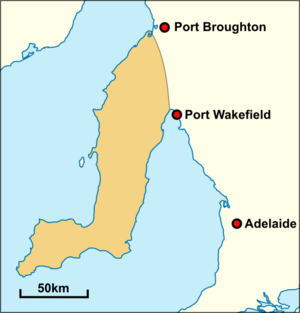Narungga facts for kids
The Narungga people, also spelled Narangga, are a group of Aboriginal Australians. Their traditional lands are found all over the Yorke Peninsula in South Australia. Their traditional language is Narungga, which belongs to the Yura-Thura language family.
Contents
Narungga Lands
The Narungga people's traditional lands covered about 6,500 square kilometers (2,500 square miles) on the Yorke Peninsula. This area stretched north to Port Broughton. Their eastern border was near the Hummock Range.
Many towns you might know are on Narungga land, including Bute, Wallaroo, Ardrossan, Marion Bay, and Cape Spencer. Their land met the Kaurna people's land at the top of Gulf St Vincent.
Narungga Language
The Narungga people speak the Narungga language. In recent years, there have been many projects to bring this language back to life. These language revival efforts help new generations learn and speak Narungga.
Narungga Groups
The Narungga people were made up of different groups. One of these groups was called Wallaroo.
Later information tells us that the Narungga had four main clans. These clans shared the Yorke Peninsula, which they called Guuranda.
- Kurnara lived in the north.
- Dilpa lived in the south.
- Wari lived in the west.
- Windarra lived in the east.
History with Europeans
The Narungga people were nomadic, meaning they moved around their lands. They used a method called fire-stick farming. This involved carefully burning parts of the land to help new plants grow and to find animals for hunting. They also ate a lot of seafood. Early European settlers were very impressed by how good the Narungga were at fishing. The Narungga often traded fish for things like tobacco.
After the British colonisation of South Australia began in 1836, European settlers started moving into the Yorke Peninsula around 1847. Before this, sealers sometimes visited the area. At that time, it's thought there were about 500 Narungga people. However, within ten years, their numbers had greatly decreased. By 1880, their population was much smaller. New diseases like scarlet fever and measles, which the Narungga people had no protection against, also caused many people to get sick and sadly pass away in the 1870s.
The European idea of owning land was very different from the Narungga's way of life, where they moved freely across their traditional lands. This difference led to the Narungga people gradually losing access to their country.
In 1868, the Point Pearce Aboriginal Mission was started by a missionary named Julius Kühn. This mission aimed to provide a place for Aboriginal people. Over time, the mission became largely self-sufficient. Kühn, who had medical knowledge, helped many Narungga people. However, new diseases continued to be a challenge, and many people at the mission became ill.
Later, a researcher named Norman Tindale spoke with a woman named Louisa Eglinton. She helped him record important information about the Narungga language and culture.
Narungga Fishing Technique
The Narungga people had a clever way to catch fish like snapper. Here's how it worked:
- First, a good-sized fish was roasted and tied in a bundle of rushes.
- This bundle was tied around the neck of a strong swimmer, hanging down their back.
- The swimmer would swim out into the sea for about a mile or more.
- Then, they would swim back to the sandy beach, with the roasted fish still behind them.
- Close to the shore, where the water was about three feet deep, the swimmer would attach the fish to a spear stuck in the sand.
- Meanwhile, other men would get their long nets ready.
- A large group of fish, attracted by the smell of the roasted fish, would follow the scent.
- Once the fish arrived, they would be surrounded by the nets and caught.
This method allowed them to catch a very large amount of fish at once.
Other Names and Spellings
- Adjadura (meaning "my people")
- Adjahdurah
- Moor-in-nunjie
- Murinandji
- Naranga
- Narrangga, Narranga, Narrang-gu, Narrang-u
- Narunga
- Nharangka
- Turra
- Wallaroo tribe
Some Narungga Words
Here are a few words from the Narungga language:
- bindiri yerli /pindira (white man)
- kadli (dingo, wild dog)
- tcha or ŋam:i (mother)
- tchela or bap:i (father)
 | Selma Burke |
 | Pauline Powell Burns |
 | Frederick J. Brown |
 | Robert Blackburn |


